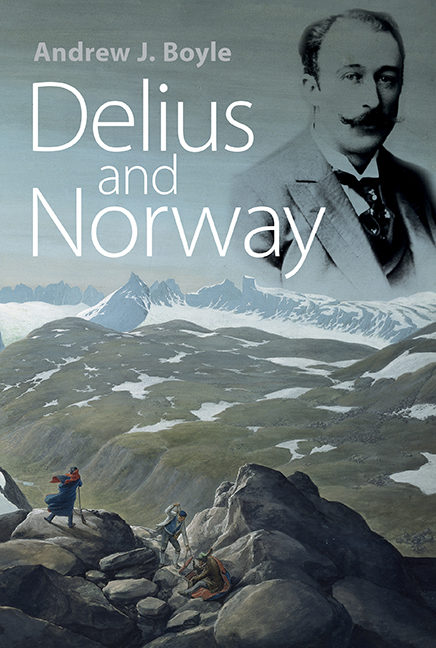Book contents
- Frontmatter
- Dedication
- Contents
- List of illustrations and tables
- Preface
- Abbreviations
- Selected glossary of landscape terms used in place names
- 1 Norway's awakening
- 2 1862–1888: Bradford, Florida and Leipzig
- 3 1888–1889: With Grieg on the heights
- 4 1890–1891: ‘C'est de la Norderie’
- 5 1892–1895: Norway lost
- 6 1896: Norway regained
- 7 1897: Front page news
- 8 1898–1902: Unshakeable self-belief
- 9 1903–1907: Breakthrough in Germany and England
- 10 1908–1912: Changes of direction
- 11 1912–1918: High hills, dark forests
- 12 1919–1934: Myth and reality in Lesjaskog
- Appendix I List of visits to Norway
- Appendix II Works with Norwegian and Danish texts and associations
- Selected bibliography and archival sources
- Index
9 - 1903–1907: Breakthrough in Germany and England
Published online by Cambridge University Press: 30 August 2017
- Frontmatter
- Dedication
- Contents
- List of illustrations and tables
- Preface
- Abbreviations
- Selected glossary of landscape terms used in place names
- 1 Norway's awakening
- 2 1862–1888: Bradford, Florida and Leipzig
- 3 1888–1889: With Grieg on the heights
- 4 1890–1891: ‘C'est de la Norderie’
- 5 1892–1895: Norway lost
- 6 1896: Norway regained
- 7 1897: Front page news
- 8 1898–1902: Unshakeable self-belief
- 9 1903–1907: Breakthrough in Germany and England
- 10 1908–1912: Changes of direction
- 11 1912–1918: High hills, dark forests
- 12 1919–1934: Myth and reality in Lesjaskog
- Appendix I List of visits to Norway
- Appendix II Works with Norwegian and Danish texts and associations
- Selected bibliography and archival sources
- Index
Summary
‘You “hear away into distances” which others have not yet heard’
Letter from Julius Buths to Delius, 26 July 1903As early as 1896, Delius had promised himself that he would never again ‘go kicking around the ante chambers of well known Conductors’ in the hope of igniting some interest in his work. In the ensuing years he was left with no option but to swallow his pride; without unlimited resources there was really no alternative. He continued, therefore, to send his scores and to make personal visits to music's power brokers, especially those in Germany; but felt that ‘only a miracle can push me thro’’. To call the breakthrough that he finally enjoyed in Germany between 1903 and 1906 a miraculous act would be to rob the composer of the credit he deserved. Delius and his closest supporters, in particular Ida Gerhardi, never stopped promoting his music. It is, however, clear that the decisive factor was the extraordinary maturing, around the turn of the century, of his creative identity and technical processes. When, at last, the dam was breached, it was because the sheer weight of artistic mastery in his music had become irresistible. Leading conductors such as Hans Haym in Elberfeld, Julius Buths in Düsseldorf, Fritz Cassirer in Berlin and Hermann Suter in Basel, as well as Max Schillings and Carl Schuricht, all experienced the same intoxicating feeling that they were discovering a hidden treasure, a unique musical genius who with every new score broke more new ground. German festivals began to compete for the prestige of giving Delius works.
Having acquainted himself with the scores of Paris, Lebenstanz and Appalachia, Julius Buths, musical director at Düsseldorf, wrote to the composer that his compositions demonstrated
that for you everything in the world which you have seen and experienced with emotion is capable of becoming music, that the world surrounds you in terms of ‘sound’ and that these sounds you carry in your very being. You ‘hear away into distances’ which others have not yet heard.
One of Delius's finest scores, Sea Drift, was composed in 1903 to words by Walt Whitman. After conducting the work in Dortmund, Carl Schuricht assured Delius that he found in his music ‘a new flowering of the purest, most spiritual and most perfect art’.
- Type
- Chapter
- Information
- Delius and Norway , pp. 197 - 214Publisher: Boydell & BrewerPrint publication year: 2017

